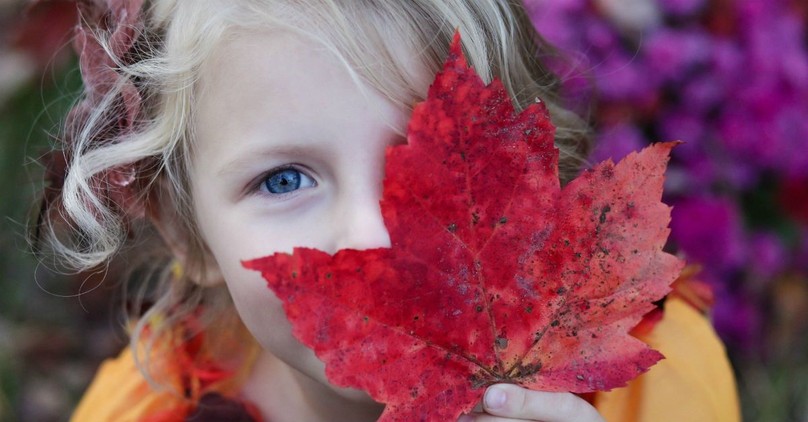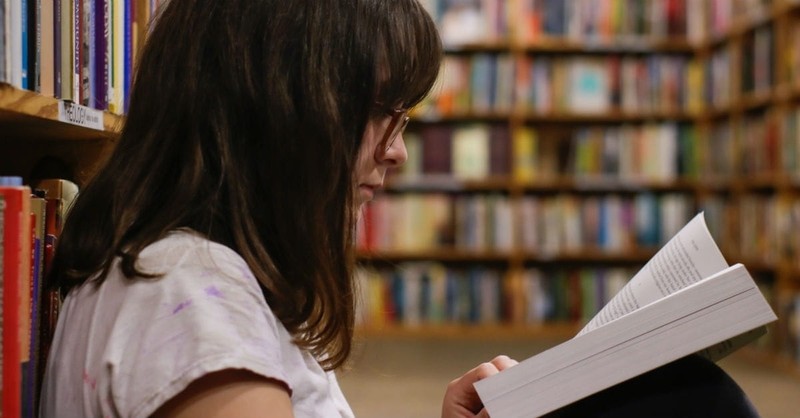
I once took five children under twelve on a walk. We rambled a bit wildly down a country road whose maples and oaks were on fire with autumn color in air so crisp and cold we had to keep moving lest we freeze. The road was quite narrow, and I quickly realized that when the occasional car appeared, I needed a means by which I could get all five (including the two boys, always a dozen yards ahead) off the pavement in an instant. The solution was obvious: we needed a touch of imagination. I gathered them round and told them a story that ended with this: What if we were brave captains of explorers’ ships on the high sea, sailing in search of treasure and adventure, and the cars were pirates, come to plunder our gold? From that moment forth, I had only to yell “Pirates!” at the sight of a car, and all five would dive instantly off the road and into the forest on either side.
However effective that use of imagination was in preserving the health of those children, what I remember most vividly is what happened afterward. Our game suffused the whole of our walk, and we began to hunt for treasure. The littlest ones scavenged the brightest leaves off the ground and put them in my hands as if they were rubies; they seized acorns like compact jewels and walnuts like nuggets of gold. Meanwhile, the bigger children came back waving curious branches that looked like the staffs of kings or yelled their discovery of the moss that clung to the trees like emerald velvet. Very quickly we forgot we were pretending. The world opened itself to us, a realm of actual treasure and real adventure that we had the chance to uncover. I remember the joy I felt in seeing afresh the autumn world in its splendor, the quickened delight of the children as the earth came into their hands as a gift.
Photo Credit: Unsplash/Gabby Orcutt

"...we do not retreat from reality: we rediscover it."
My silly little story shifted our sight, and in that moment, we experienced what C. S. Lewis calls “a dipping in myth” (or imagination). “By putting bread, gold, horse, apple, or the very roads into a myth, we do not retreat from reality: we rediscover it.”
That’s what works of imagination do for us every day. What we rediscover in reading them is the extraordinary nature of real life. What we reclaim is a view of the world as charged with meaning, as shot through with the truth, beauty, and wisdom that we were created to find. From the disenchantment of a materialistic or simply bored viewpoint, in which things like trees and babies, music and story have lost their power to amaze or shape us by their truth, we are startled back into a wondering engagement with reality in its fullness. Sometimes this comes to us as worship, a renewed capacity to perceive that creation isn’t just matter or atoms but a gift crafted of love. Sometimes it comes to us as hope, a quickened ability to glimpse beauty and wholeness beyond our current moment of doubt.
Photo Credit: Unsplash/Felix Russell Saw

"...crucial to our capacity for faith, for joy in existence, for hope."
Always, it comes to us with the power to show us the world “in a new and strange light” that cleans away the grime of cynicism or boredom and invites us to treasure our existence as a gift. The authors that follow include many of my favorites—C. S. Lewis, J. R. R. Tolkien, Malcolm Guite—each of whom has argued for imagination as a “truth-bearing faculty,” one we desperately need to cultivate in our busy, materialistic age, one that is crucial to our capacity for faith, for joy in existence, for hope.
Photo Credit: Unsplash/Alfons Morales

"Poetic Diction: A Study in Meaning" by Owen Barfield
Barfield, close friend and interlocutor of C. S. Lewis, wrote this classic exploration of the way imaginative language (the kind we use in poetry or story) can help a reader to experience—actually experience—the world in a different way. With Lewis, he believed that the modern world needs to have its vision reenchanted from the dulling effects of materialism. In this book, he shows us how imaginative language specifically works to kindle and quicken both mind and vision.
Photo Credit: Unsplash/Rawpixel

"Following Gandalf: Epic Battles and Moral Victory in The Lord of the Rings" by Matthew Dickerson
An invigorating and revelatory exploration of Tolkien’s work from a philosophical perspective. Dickerson’s lively book makes clear that the runaway success of The Lord of the Rings has deep roots in the redemptive philosophy it communicates.
"Ten Ways to Destroy the Imagination of Your Child" by Anthony Esolen
Esolen is often grumpy and frequently repetitive in this slightly sarcastic but eloquent book on the ways we increasingly stunt childhood imagination. In the role of devil’s advocate, Esolen exposes the danger of such modern trends as dismissing the skill of memorization, keeping children indoors, and denying the transcendent. But he also offers a vision of the opposite kind of life—of children exposed to beauty, allowed to wonder, steeped in ancient worlds—a recipe for restored imagination that is always available to those who would choose it.
Photo Credit: Unsplash/Waranont Wichittranont

"Faith, Hope and Poetry: Theology and the Poetic Imagination" by Malcolm Guite
Reading this book was a watershed moment in my life, the point at which I finally felt I understood historically why the status of imagination as “a truth-bearing faculty” has to be defended and must be reembraced. Tracing the history by which the language of imagination, story, and even parable was forced out by scientific precision, Guite advocates for a revival of imagination, specifically through poetry, and for the importance of the imagination to our faith. In eight themed chapters, he surveys the work of poets from Shakespeare to Heaney whose works of poetic imagination bear spiritual truth to the world in a powerful way.
Photo Credit: Unsplash/Ellyot

"On Stories: And Other Essays on Literature" by C. S. Lewis
This themed collection of Lewis’s essays on imaginative fiction brings together some of his best ideas about the power of atmosphere in story, the qualities that make for excellent storytelling, and the transcendent beauty evoked by works of imagination. It includes classics such as “On Three Ways of Writing for Children” and “Sometimes Fairy Stories May Say Best What’s to Be Said,” essays that articulate his understanding of imagination and story as some of the best ways we understand the ultimate truths about ourselves and the world.
Photo Credit: Unsplash/Radu Marcusu

"The Renaissance of Wonder: The Fantasy Worlds of C. S. Lewis, J. R. R. Tolkien, George MacDonald, E. Nesbit, and Others" by Marion Lochhead
A PhD thesis that turned into an exploration of the great fantastical books of the twentieth century, this book first looks in depth at the work of writers such as E. Nesbit, Tolkien, Lewis, and MacDonald before surveying the greatest fantastical works for children at the time of publication. I’m still trying to get to all the titles so beautifully described in this celebration of fantastical children’s literature.
"A Landscape with Dragons: The Battle for Your Child’s Mind" by Michael D. O’Brien
This is a book I recommend with caveats. On the one hand, I highly value O’Brien’s perspective on the way fantasy and fairy tale shape a child’s inward and spiritual realities. I prize his affirmation of good fantasy to aid a healthy development of courage and virtue, the qualities needed in a real-world resistance of evil. But I disagree with his conclusions deeming the work of J. K. Rowling and Madeleine L’Engle harmful. I think they are rather the opposite. So I would advise you to take this book with a grain of salt. It’s excellent in many aspects and flawed in some, but eminently worth the read.
Photo Credit: Unsplash

"The Christian Imagination: The Practice of Faith in Literature and Writing" by Leland Ryken
A collection exploring some of the best Christian writing on the joyous relationship between faith and literature, this volume of excellent essays could be themed in the words of Francis Schaeffer (quoted by Ryken): “The Christian is the one whose imagination should fly beyond the stars.”
"Tree and Leaf" by J. R. R. Tolkien
Herein you will encounter Tolkien’s eloquent defense of fantastical stories as vital to the human condition. In his landmark work “On Fairy-Stories,” he identifies a threefold process through which fairy stories (and fables, myths, and fantastical tales) allow us fresh spiritual insight and a renewed interaction with reality through recovery, escape, and consolation. Here, too, you will find his description of “eucatastrophe,” the “sudden and miraculous grace” that comes to us in a happy ending and “denies (in the face of much evidence, if you will) universal final defeat and in so far is evangelium, giving a fleeting glimpse of Joy, Joy beyond the walls of the world poignant as grief.” One of my favorite quotes in literature.
Photo Credit: Unsplash/Eliott Reyna

"Planet Narnia: The Seven Heavens in the Imagination" of C. S. Lewis by Michael Ward
If you love Narnia, this book will rivet you from first page to last. Ward, called the world’s foremost C. S. Lewis scholar by no one less than N. T. Wright, here makes his fascinating claim that the Chronicles of Narnia are each individually themed on a single planet in the medieval model of the cosmos. It seems a wild scheme at first glance, but Ward’s painstaking and detailed research, his appeal to the (wholly provable) evidence of Lewis’s lifelong fascination with the medieval model, and his demonstration of his thesis in a careful exploration of each book brought me to total agreement. But the reason this book is here is because Ward’s claims are based in part on his understanding of how Lewis viewed imagination and how he sought to imbue his novels with the person of Christ, and the chapters exploring those themes are as vital in their way as the rest of the book.
Photo Credit: Unsplash/Alessandro Capuzzi

"Dostoevsky: Language, Faith, and Fiction" by Rowan Williams
This is a dense and difficult book, the kind I wouldn’t usually include on a nonacademic list, but it helped me to think with rigor about the power of language, image, and character as employed by Dostoevsky to evoke and explain religious faith. If you want to delve into a contemporary evaluation of the way literature presents us with what could be considered incarnational opportunities and characters—when the divine breaks into the ordinary—or what it means for people to be iconic in their nature—gesturing to a larger grace—Williams’s book is well worth the struggle.
Adapted From Book Girl: A Journey through the Treasures and Transforming Power of a Reading Life by Sarah Clarkson, releasing from Tyndale House Publishers in September, 2018
Sarah Clarkson is an author, a blogger, and a student of theology. She graduated from Wycliffe Hall, in Oxford, with a bachelor's degree in theology, where she also spent a proud year as president of the Oxford University C. S. Lewis Society. She's the author of Read for the Heart (a guide to children's literature), Caught Up in a Story (on the formative power of story), and Journeys of Faithfulness (a creative, contemplative devotional for young women), as well as the upcoming Book Girl (a woman's guide to the reading life). Through blogs, books, and her current research, she explores the theological significance of story, the intersection of theology and imagination, and the formative power of beauty. She writes regularly about her adventures at sarahclarkson.com and is at slow work on a novel. She can often be found with a cup of good coffee in one of the many quaint corners amid Oxford's "dreaming spires," where she lives in a red-doored cottage with her husband, Thomas and their daughter, Lilian.
Photo Credit: Unsplash
Originally published Tuesday, 04 September 2018.








